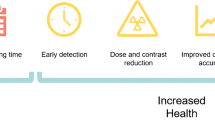Abstract
Machine learning and artificial intelligence (AI) algorithms hold significant promise for addressing important clinical needs when applied to medical imaging; however, integration of algorithms into a radiology department is challenging. Vended algorithms are integrated into the workflow, successfully, but are typically closed systems and unavailable for site researchers to deploy algorithms. Rather than AI researchers creating one-off solutions, a general, multi-purpose integration system is desired. Here, we present a set of use cases and requirements for a system designed to enable rapid deployment of AI algorithms into the radiologist’s workflow. The system uses standards-compliant digital imaging and communications in medicine structured reporting (DICOM SR) to present AI measurements, results, and findings to the radiologist in a clinical context and enables acceptance or rejection of results. The system also implements a feedback mechanism for post-processing technologists to correct results as directed by the radiologist. We demonstrate integration of a body composition algorithm and an algorithm for determining total kidney volume for patients with polycystic kidney disease.







Similar content being viewed by others
Data and/or Code Availability
Code referenced in this paper is not available for dissemination.
References
Erickson, B.J., et al., DEWEY: the DICOM-enabled workflow engine system. J Digit Imaging, 2014. 27(3): p. 309-13.
Radiology Technical Committee, IHE Radiology Technical Framework Supplement AI Results (AIR). Integrating the Healthcare Enterprise, 2020.
Merkel, D., Docker: Lightweight Linux containers for consistent development and deployment. Linux Journal, 2014. 2014 (March).
Integrating the Healthcare Enterprise IHE IT Infrastructure Technical Framework. 2020. 1.
Inc., G., AngularJS Developer Guide. https://docs.angularjs.org/guide.
Hafey, C. cornerstone.js. 1/28/2021]; Available from: https://cornerstonejs.org/.
DICOM Standards Committee, PS3.20: DICOM PS3.20 2020d - Imaging Reports using HL7 Clinical Document Architecture. 2020: NEMA.
Weston, A.D., et al., Automated abdominal segmentation of CT scans for body composition analysis using deep learning. Radiology, 2019. 290(3): p. 669-679.
Kline, T.L., et al., Performance of an artificial multi-observer deep neural network for fully automated segmentation of polycystic kidneys. J Digit Imaging, 2017. 30(4): p. 442-448.
Acknowledgements
The authors are indebted to Scott Inglett, David Scheid, and David McGaa from Development Shared Services for the initial implementation of the ROCKET system, and to William Ryan for DICOM SR and fruitful use case discussions. The authors acknowledge Sonia Watson, PhD, and Lucy Bahn, PhD, for their assistance in editing this manuscript.
Funding
This work was funded by internal departmental resources.
Author information
Authors and Affiliations
Contributions
Concept and design: D. Blezek, P. Korfiatis, L. Olson-Williams, Drafting the manuscript: D. Blezek, P. Korfiatis, Software development: L. Olson-Williams, Revising the manuscript critical for important intellectual content: P. Korfiatis, L. Olson-Williams, A. Missert, Approval of the manuscript to be published: D. Blezek, P. Korfiatis, L. Olson-Williams, A. Missert.
Corresponding authors
Ethics declarations
Ethics Approval
This study did not involve human research and no ethics approval was required.
Consent to Participate
This work did not involve human research and, thus, not consent to participate was required.
Consent for Publication
This work did not involve human research and, thus, not consent to publish was required.
Conflict of Interest
The authors declare no competing interests.
Additional information
Publisher's Note
Springer Nature remains neutral with regard to jurisdictional claims in published maps and institutional affiliations.
Rights and permissions
About this article
Cite this article
Blezek, D.J., Olson-Williams, L., Missert, A. et al. AI Integration in the Clinical Workflow. J Digit Imaging 34, 1435–1446 (2021). https://doi.org/10.1007/s10278-021-00525-3
Received:
Revised:
Accepted:
Published:
Issue Date:
DOI: https://doi.org/10.1007/s10278-021-00525-3




